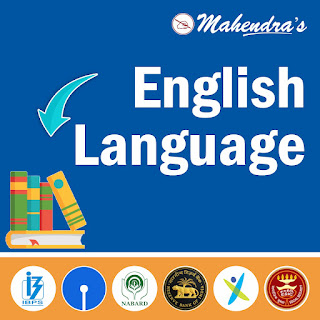Dear Readers,Mahendras has started special quizzes for BPS | RBI | SBI | NABARD | ESIC | SIDBI so that you can practice more and more to crack the examination. This BPS | RBI | SBI | NABARD | ESIC| SIDBI NABARD Exam special quiz series will mold your preparations in the right direction and the regular practice of these quizzes will be really very helpful in scoring good marks in the Examination. Here we are providing you the important question of English Language for the BPS | RBI | SBI | NABARD | ESIC| SIDBI .
In the following passage there are blanks each of which has been numbered as well as
fi lled with a word which may be appropriate in context of the passage or maybe not. If the word highlighted is incorrect and needsimprovement then choose any one option suggested given below. But if the given word is correct and requires no change then mark (5)i.e. no change required as your answer.
It will be a travesty of its avowed objectives if the proposed legislation to protect the rights of
transgender persons is not suffi ciently rooted in a rights-based approach. News that the Centre has furbished(1) aside a parliamentary standing committee’s report and plans to introduce the Transgender Persons (Protection of Rights) Bill without changes is a disappointment. The process of recognising the rights of the community and seeking to protect it by legislation gained momentum in 2014, when the Supreme Court gave a landmark verdict in the NALSA case. The court recognised the community as a third gender entitled(2) to the same rights and constitutional protection as other citizens. It called for an end to discrimination based on gender against those who do not conform to the gender assigned to them at birth. Besides this negative right against discrimination, the court ruled that transgender persons had a prospective(3) right to make decisions about themselves, express themselves and participate in community life. It directed the government to nay(4) them socially and educationally backward status so they could benefi t from affi rmative action. In 2014, a private member’s Bill moved by DMK MP was passed in the lower parliament. In the upper parliament, the government introduced its own Bill, which was referred(5) to the Standing Committee on Social Justice and Empowerment. The Standing Committee, in its July 2017 report, suggested some modifi cations and additions to the draft. In particular, it disagreed with the defi nition of ‘transgender’ in the draft Bill and wanted modifi cations to bring it in line with global norms. The Committee felt that the defi nition aided(6) the principle that transgender persons have a right to self-identifi cation of their gender. Volunteers(7) and experts have also rightly pointed to the absence of any reference to the implications of criminal and civil laws that are based on the traditional gender binary. While provisions on equality and non-discrimination would promote equal opportunity, in the process the real benefi t of reservation in jobs should not be denied. Social legislation should
not be merely benevolent; rather, it should be trenched(8) with an approach that extends to the marginalised sections the freedom, dignity and autonomy that other citizens enjoy. In the district(9) of legislation, disagreements over drafts are natural. It is up to the government of the day to adopt an inclusive approach towards divergent opinions and come up with the best law possible. Overlooking(10) the opinions of experts and parliamentary committees does not help the process. The Centre should revisit its draft and incorporate the inputs of the standing committee and an expert panel that submitted a report in 2014.
Q.1. (1) Flicked (2)brushed (3)seeped (4) skimmed (5)No change required
1-1
2-2
3-3
4-4
5-5
Q.2. (1) denominated (2) confused (3) troubled (4) enlightened (5) No change required
1-1
2-2
3-3
4-4
5-5
Q.3. (1) negative (2) attractive (3) positive (4) creative (5) No change required
1-1
2-2
3-3
4-4
5-5
Q.4. (1) accord (2) refuse (3) differ (4) abstain (5) No change required
1-1
2-2
3-3
4-4
5-5
Q.5. (1) invoked (2) ascribed (3) quoted (4) excerpted (5) No change required
1-1
2-2
3-3
4-4
5-5
Q.6. (1) violated (2) assisted (3) purifi ed (4) regarded (5) No change required
1-1
2-2
3-3
4-4
5-5
Q.7. (1) Advocates (2) Activists (3) Novelist (4) Journalists (5) No change required
1-1
2-2
3-3
4-4
5-5
Q.8. (1) sunk (2) imbued (3) ditched (4)culverted (5) No change required
1-1
2-2
3-3
4-4
5-5
Q.9. (1) territory (2) empire (3) terrain (4) domain (5) No change required
1-1
2-2
3-3
4-4
5-5
Q.10. (1) forgetting (2) ignoring (3) omitting (4) slighting (5) No change required
1-1
2-2
3-3
4-4
5-5
ANSWERS:-
Answer-1-(2)
Answer-2-(5)
Answer-3-(3)
Answer-4-(1)
Answer-5-(5)
Answer-6-(1)
Answer-7-(2)
Answer-8-(2)
Answer-9-(5)
Answer-10-(2)





0 comments:
Post a Comment
MAHENDRA GURU